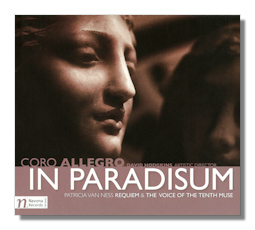
The Internet's Premier Classical Music Source
Related Links
- Latest Reviews
- More Reviews
-
By Composer
-
Collections
DVD & Blu-ray
Books
Concert Reviews
Articles/Interviews
Software
Audio
Search Amazon
Recommended Links
Site News
 CD Review
CD Review
Patricia Van Ness

In Paradisum
- Requiem *
- The Voice of the Tenth Muse **
* Sanford Sylvan, baritone
** Ruth Cunningham, soprano
Coro Allegro Orchestra & Chorus/David Hodgkins
Navona Records NV5890
Navona bills this ensemble as Boston's leading LGBT choral ensemble (including friends of that community). I feel like that needs to be said, because that will doubtless stir feelings upon purchase, for good, ill, or indifference. If you can completely ignore the socio-political issues here and just focus on the music – something we should do regardless of performance origin, you are in for some absolutely ravishing music. Classical music as an industry seems to need reasons to "stay interesting", whether it be a youth orchestra, players from oppressed nations, or a certain social group. In this case, I agree with Navona's promotion (for my own reasons), but feel that it's not a good idea to put that before the music at hand. So please, enjoy the music for its own sake.
Patricia Van Ness is a composer completely new to me, and that's my loss. She writes absolutely beautiful music, with a fondness for chant-like chords and harmonies. With over 15 years of choral experience myself, this is the real deal. Granted, it's not as pop-inspired as John Rutter, nor is she a master of text like Morton Lauridsen, and she's not as chord-obsessed as Eric Whitacre. Depending on your bias, any of these things could be good or bad, but whatever the case Van Ness is entirely convincing in both works.
The Requiem is fairly traditional in its structure, and should be fairly easy to follow for choral fans and/or those who follow from a religious point of view. Actually, it's the more traditional work generally, and is probably the more accessible of the two pieces. It's a lovable and touching setting of the Requiem Mass, closer to Faure in mood than say, Verdi. It features some terrific choral writing that never lets the orchestra get in the way. Baritone Sanford Sylvan intones his cantor-like solos with a tremendous amount of conviction and dignity. The writing for the men is especially good, especially interwoven with the aforementioned solo work. A lovely piece.
The Voice of the Tenth Muse is much more challenging on the ear, at least compared to the Requiem. But it also shares all of the same virtues, great choral writing, great solo work, absolutely breathtaking harmonics, and everything one looks for in choral music. Ruth Cunningham is accomplished in her rendering of a challenging solo part. The final movement is magical. Throughout, Coro Allegro shares these works with us with a genuine sense of love and discovery.
However, it must be said that compared to other ensembles, Coro Allegro lacks polish and the best in choral standards. Both instrumental and vocal intonation are occasionally questionable, and sung vowels are iffy. Worse, the whole program – at least on my equipment – is simply too "boomy" and resonant, leading to mushy text and exposure of flaws. But, as I implored in my opening paragraph, this is all about the music, which is glorious. Moreover, the commitment to the cause is beyond question, giving us pause before we nitpick. Politics aside, this remains an excellent regional ensemble which champions contemporary music. Life would be better if we had more of that, and maybe we will, thanks to the efforts of Navona and Coro Allegro.
Copyright © 2013, Brian Wigman




















